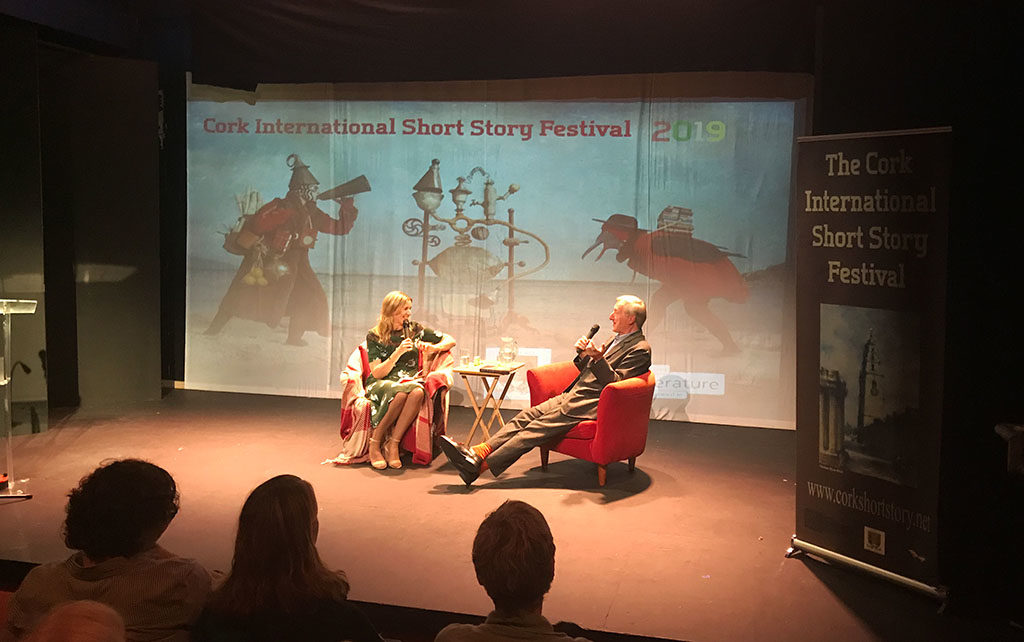Reviewed six events including Danielle McLaughlin, Julian Barnes, and Kevin Barry, all hosted at Cork Arts Theatre between 25 – 28 September 2019
‘The informal passing back and forth of books became a feature of the festival too. There weren’t formal queues to book signing tables – there weren’t book signing tables – if you wanted an author’s scribble on your title page, you grabbed them in the bar. And if you missed the opportunity before the bell rang for the next event, you could probably find them after the next one… It was heartening to see so many of the invited writers attending each other’s readings and sticking around for the whole festival’.
David Constantine launched his latest short story collection, The Dressing-Up Box (Comma Press) and at the event he shared insight into his writing process
‘Time is simultaneous, not linear. The past is in the present because it is being remembered in the present’.
Read Phil’s Twitter thread on the event which includes a few tips for short story writers.
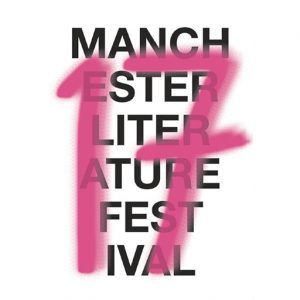
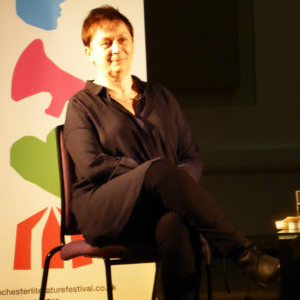
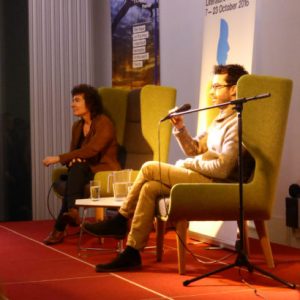
Reviewed Danish author Dorthe Nors’ world literature talk at the International Anthony Burgess Foundation, 7 October 2017
‘Asked how she arrived at short stories, she explained that her novels got slimmer and slimmer each time and it “felt like I’d been trying to learn cello and then discovering that I was actually quite good at the ukulele.” She admires the challenge of a short story, having to be on beat all the time with no room to make mistakes.’
Read Phil’s full write-up on Chapter & Verse, the Manchester Literature Festival blog.
Reviewed the Anne Enright headline event at Hallé St Peters, 17 October 2016
‘The characters are alive with their respective anxieties […] The mother seems more controlled. Feeling blessed with a loving family and an attitude of ‘I’m so lucky to be here’, she is happy to overspend at the supermarket. “The bill came to 410 Euros. A new record.” Her shopping list is hilarious and there’s room in the trolley for some pathos, too: “More out of habit now the children were grown, she got packs and packs of batteries.”‘
Read Phil’s full write up on Chapter & Verse, the Manchester Literature Festival blog.
Reviewed the Manchester Literature Festival headline event Jonathan Safran Foer in conversation with Jeanette Winterson at Central Library, 11 October 2016
‘Jeanette perceived a change in Jonathan’s narrative point of view, from the precocious and dazzling protagonists of Everything is Illuminated to someone more mature and reflective – perhaps the effect of a ten year gap before this novel? Or of fatherhood? Jonathan explained that he always feels the thing he is writing is the last thing he’ll ever write – and in a way that’s true, because his next book will be written by a different person. He recalled being told by a philosophy professor not to fear death because you are not going to die; an older, more prepared version of you is. Then he added: “But then the professor died and there’s no way he wasn’t sweating bullets!”‘
Read Phil’s full write-up on Chapter & Verse, the Manchester Literature Festival blog.
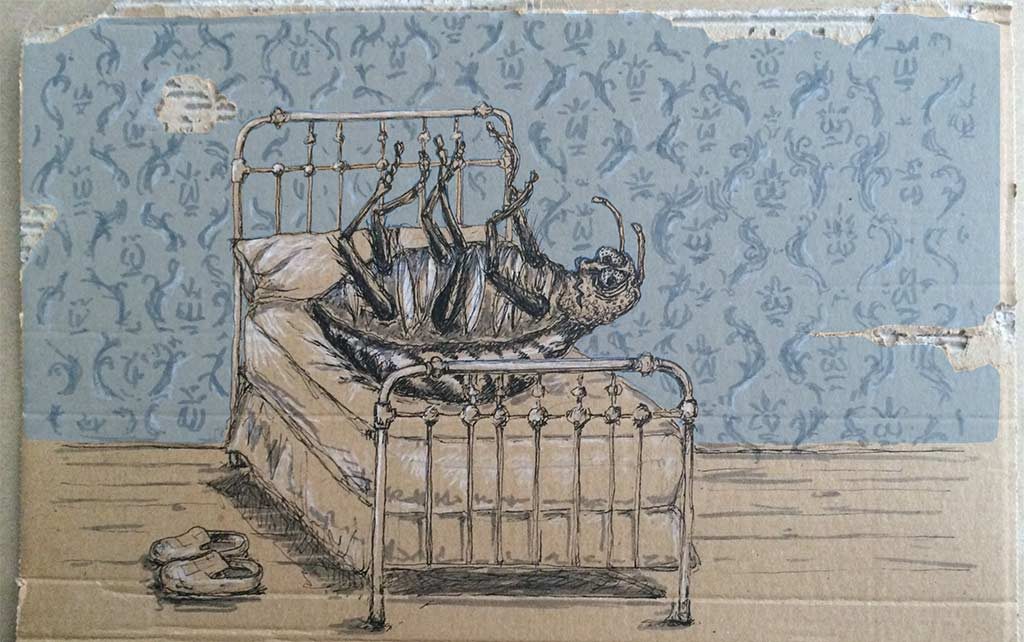
Guest blogger for Sarah Schofield’s Comma Press Short Story Course at Bluecoat, January 2016
Month one – Introductions
‘We undertook not one, but two writing exercises in the class. The first was an ice-breaker exploring the history of our respective names (Ancient Greek lover of horses, at your service) and the second involved choosing an image from a selection of photographs to take inspiration from. I picked up an unloved swan pedalo, overgrown with pond reeds. Both of these activities helped us put pen to paper and get past the fear of a blank page.
‘Sarah stressed the importance of “Allowing yourself to write badly”. If you get it written down then you’ve got something to work on. Something to redraft and make better.’
Read Phil’s full write-up of the first workshop on the Bluecoat website blog
Guest blogger for Sarah Schofield’s Comma Press Short Story Course at Bluecoat, February 2016
Month two – The Epical Story
‘Sarah began the session standing beside a projection of a pencil crayon frog. The group was invited to “Say what you see”, as Roy Walker would put it, and much 3D-magic-eye squinting around the table ensued. It turned out we’d been cunningly misdirected… We’d naively been taking the image at face value and staring at the frog straight on. Then, as though it had been choreographed, our heads all fell to our right shoulders and we suddenly saw that the frog was also a horse – well, the head of a horse – when viewed side-on. Like Jack Woltz waking up in The Godfather, the horse’s head came as something of a surprise. And once seen it could not be unseen.’
Read Phil’s full write-up of the second workshop on the Bluecoat website blog
Guest blogger for Sarah Schofield’s Comma Press Short Story Course at Bluecoat, March 2016
Month three – The Lyrical Story
‘Open ended stories would appear to span the ages – we flew back to 1922 for Katherine Mansfield’s ‘The Fly’, a tale of pondering death and putting ink and blotting paper to misuse. And then we front-crawled it to the recent past of 2011 for Jon McGregor’s sea swimming yarn, ‘We Wave and Call’. We learn enough in each to know what is going on, but the reader ultimately gets to decide the fate of the characters (insect or human). Nothing is spelt out and nothing is definite. Where epical stories deliver a reveal at the end in which everything clicks into place, lyrical stories plant a bunch of seeds and then take their leave. ‘We Wave and Call’ certainly lingered in my mind long after I finished reading it.’
Read Phil’s full write-up of the third workshop on the Bluecoat website blog
Guest blogger for Sarah Schofield’s Comma Press Short Story Course at Bluecoat, April 2016
Month four – The Artifice Story
‘What really makes the artifice story work is that everything else is normal and humdrum. If there were several fantastic elements, or if everything was strange in this world, then we’d be in fairy tale territory or fantasy fiction. Here it is the clashing of components that intrigues the reader; the merging of two seemingly incompatible ingredients. The mundane and the fantastic, together at last.
‘The fact that there’s just one bizarre aspect helps us suspend our disbelief. The rest of the world is close enough to our own, with its logic and rules; with its train connections to make and its debts to pay off. Gregor Samsa [in Kafka’s Metamorphosis] doesn’t spend his time trying to figure out how or why he’s been transformed into an oversized bug, but rather on trying to figure out how he is going to get to work. He mostly accepts his metamorphosis as a mere inconvenience and strives to crack on with his day.’
Read Phil’s full write-up of the fourth workshop on the Bluecoat website blog
Guest blogger for Sarah Schofield’s Comma Press Short Story Course at Bluecoat, May 2016
Month five – Character, Dialogue and Description
‘One of our writing exercises this month involved compiling 20 random questions to pose to the characters we’d created. Without spending too long thinking about it, we then had to imagine what our character would do in each scenario, and scribble it down.
A few of the questions our characters had to answer included:
- What do you carry in your pockets or handbag?
- What would you do if you witnessed a homeless person pickpocketing someone in an expensive looking suit?
- What were you doing at the time of 9/11?
‘My protagonist’s answers to those questions were as follows:
- A stolen car radio
- Blackmail the homeless person for a share
- Operating the swan pedalos at a theme park that has long since closed down.
‘Immediately afterwards I felt like I knew so much more about my first story’s lead character. I’m not going to pretend I wasn’t a little disappointed by some of his behaviour, but hey, it was good of him to open up to me. The 9/11 question threw me especially – not because of the significance of the events of that day, but because it meant I had to picture what was going on in my character’s life a whole 15 years before my story took place.’
Read Phil’s full write-up of the fifth workshop on the Bluecoat website blog
Guest blogger for Sarah Schofield’s Comma Press Short Story Course at Bluecoat, June 2016
Month six – Editing and Redrafting Your Work
‘In this final session we warmed up by writing something based on an object. It didn’t have to be a new story though – the object could be dropped in to create ripples in an existing story. The assortment to choose from ranged from a pocket watch to a set of Russian dolls and from a bottle of Tabasco sauce to the Head Girl badge that I picked up (something I never attained in my youth).’
Read Phil’s full write-up of the sixth workshop on the Bluecoat website blog
